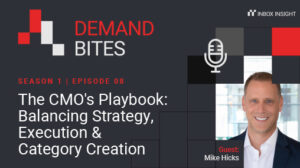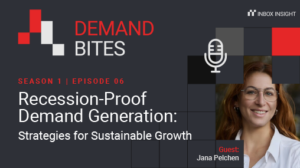Compared to the more traditional mass-marketing email campaigns, the emerging trend of Account-Based Marketing (ABM) has proven to be a lot more beneficial for B2B marketers.
So, we decided to investigate further to get a better idea of how and why more businesses are choosing ABM for their marketing strategy.
Below we’ll look at some of the key findings from our Account-Based Marketing (ABM) Research Report 2023 which surveyed 200 senior B2B marketing professionals within our Insights for Professionals (IFP) community to help prove why this more targeted approach can help your campaigns, and therefore sales, perform better. So if you’re a B2B marketer looking to implement ABM into your strategy this year, here are five facts that you need to know:
Fact 1: ABM provides higher ROI than other marketing activities
One of the biggest impacts of ABM is the increased return on investment (ROI). When asked how the ROI from ABM strategies compares to that of other marketing activities the majority, almost two-thirds (64%) of B2B marketers, said it was higher. 20% said it was about the same, while 14% found it to be lower than other marketing techniques. The full breakdown of results looks like this:
How does ABM ROI compare to other marketing activities?
- Significantly higher – 33%
- Slightly higher – 31%
- About the same – 20%
- Slightly lower – 5%
- Significantly lower – 9%
- I don’t measure ROI – 2%
Those who aren’t measuring their results, simply haven’t worked out how. If you’re not measuring results, how do you know what’s performing well? What needs improving? Or whether budget is being well spent? If you’re looking for a helping hand, take a look at our guide for measuring ABM activity.
Fact 2: Market growth is the top Key Performance Indicator (KPI) for ABM programs
Our research found that over half (55%) of senior marketing professionals consider market growth the number 1 KPI to look out for within their ABM programs. This is followed by customer retention (49%) and lead generation (47%).
When considering variations between the US vs UK, here’s how the top 3 KPIs marketers rely on differ across regions:
- US: market growth (54%), account expansion (49%), lead generation (45%).
- UK: market growth (55%), customer retention (54%), lead generation (49%).
It’s clear that market growth is high on the agenda when it comes to ABM results regardless of location – unsurprising given the current climate where gaining market momentum is key to remaining competitive.
Fact 3: ABM is driven by great content
Leveraging ABM is all about creating tailored and personalized messages for existing clients, and this is one of the reasons it works so well; because everybody loves personalized content and offers! No one wants their inbox filling up with information that isn’t relevant to them, which makes personalized content absolutely key to the success of ABM.
And it’s the job of the marketing team to create this engaging content. When asked what steps they are taking to ensure their Account-Based Marketing strategy includes relevant and engaging content for their target accounts, B2B marketers revealed the top methods they are using:
- Building targeted account lists based on firmographic and technographic data (47%)
- Leveraging account-based advertising to reach target accounts (47%)
- Leveraging action based intent signals to prioritize target account lists (44%)
- Personalizing marketing messages based on account-level data insights (43%)
- Implementing predictive analytics to identify ideal customer profiles (ICP) (40%)
- Personalizing marketing messages based on individual-level data insights (39%)
- Using a data management platform to integrate and analyze customer data (37%)
- None of the above (2%)
By utilizing the strong sales funnels created through ABM, less time and resources are needed for less-effective marketing techniques such as blanket emails that target hundreds, if not thousands, of prospective customers.
Fact 4: More marketers will be investing in ABM and setting aside larger budgets
The majority (41%) of B2B marketers allocate 25-50% of their overall marketing budget to ABM. This is also the case for US marketers (41%), closely followed in the UK (40%) – evidence of a consistent and considerable spend across the globe in favor of the Account-Based Marketing approach.
Over a quarter (27%) of marketing professionals allocate over 50% of their overall marketing budget to their Account-Based Marketing strategy. When considering regional variations, over a third (34%) of US marketing teams allocate 50% and above while just under a fifth (19%) of UK teams do the same. This indicates that far more of the overall marketing budget is dedicated to Account-Based Marketing activities in the US than in the UK – reflective of the maturity levels and ROI from such marketing efforts.
Just 3% of marketers overall plan to spend between 0-10%, which speaks volumes for this strategic approach and the way brands leverage account-based marketing not only now but for the future of B2B marketing.
Looking at ABM spending plans over the next 12 months, it’s even clearer that ABM investment is going nowhere other than up!
Senior B2B marketers are prepared to invest huge chunks of their overall budget into these techniques, further supporting the idea that running an effective ABM strategy is worth the investment.
Fact 5: Implementing ABM tech has multiple benefits to businesses
From looking at the data above it’s apparent that ABM can have some extraordinary results on a business’ overall revenue, ROI and sales funnels, but the benefits don’t stop there. What about adding tech to the mix? Here’s the key areas as identified by senior marketing professionals, that would benefit from implementing tech to their ABM approach:
- Improved targeting (38%)
- Increased efficiency and productivity (38%)
- Better collaboration between sales and marketing teams (37%)
- Improved measurement and reporting (37%)
- Predictive analytic tools (33%)
- Improved scaling opportunities (32%)
- Better access to behavioral data (31%)
- Better account prioritization (29%)
- Advanced personalization capabilities (27%)
It’s only too clear that businesses who are using ABM are seeing some real results both to their revenue, customer/client relationships and the alignment of their teams. These statistics have shown that ABM is a very effective marketing tactic and that more B2B brands plan to invest in this in the future for the increased effectiveness and ROI it can bring.
Ready to unleash the power of account-based marketing? Uncover the key questions B2B marketers are asking and get comprehensive answers in our easy-to-digest ABM infographic.






